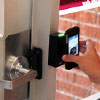
Arizona State University's New NFC Mobile Access Control Pilot Program
The world's first university pilot of NFC smartphones carrying digital keys was recently completed.
HID Global implemented the pilot using the company’s SIO technology, a key feature of its award-winning, next-generation iCLASS SIO-enabled (iCLASS SE) credential and reader platform that transforms how secure identity is delivered and managed while enabling new levels of access control security, portability and performance.
“The completion of this pilot is an important step toward global deployment of mobile access control technology beyond cashless payment applications,” said Debra Spitler, vice president of mobile access solutions with HID Global. “The pilot results have clearly demonstrated the benefits of opening doors using digital credentials that have been securely embedded into NFC smartphones. We are very pleased with the results, and appreciate all of the valuable help from ASU and pilot partners ASSA ABLOY Americas, Device Fidelity, Kratos/HBE, Research In Motion and Verizon Wireless.”
The mobile access control pilot at Arizona State University (ASU) was the first to validate the use of digital credentials on NFC smartphones for physical access control on a college campus. A group of ASU staff and students were given NFC smartphones containing HID Global’s iCLASS SE credential technology, which was recognized this year with awards at some of the industry’s most influential conferences in 2011 including ASIS International and CARTES & IDentification. The ASU pilot participants gained access to their residence hall and selected rooms by presenting the phones to their door readers, just like they do with their existing iCLASS-based physical campus ID cards. Participants used a variety of popular smartphones connected to all major mobile networks. For more information, view the Arizona State University case study video with a first-hand look into the pilot and commentary from many of the partner participants.
“The initial feedback we received mid-way through the pilot in September was confirmed through its completion, cementing our vision of a future where virtual identities can be created for each registering student and then delivered to them via a mobile application,” said Laura Ploughe, director of business applications and fiscal control, University Business Services, at Arizona State University. “This pilot proved the viability of the NFC-based mobile access model using secure portable credentials and the next generation of advanced access control systems, and also confirmed the high value that staff and students place on using their phones for more and more applications, including opening doors throughout the campus.”
SIO technology protects the integrity of identities, regardless of the card technology, while enabling the use of multiple form factors ranging from smartphones to microprocessor-based cards, contactless smart cards and other devices. SIOs on the credential side and the SIO Processor™ on the reader side work together to execute functions previously performed by traditional cards and readers, using a new standards-based, technology-independent and flexible identity data structure that significantly enhances security, portability and performance. SIOs are at the heart of HID Global’s iCLASS SE platform, which is an essential building block in the access control industry's first NFC-enabled mobile identity and access management solutions.
HID Global’s SIO processor and iCLASS SIO-enabled (iCLASS SE) credential and reader platform are available now.
Mobile access using NFC has received broad support across the industry. Companies and partners across the ecosystem recognize that NFC is the future of physical access and are committed to its development, integration and deployment.